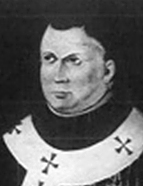

Thus, by the age of forty, Friar Fortunato's academic career was already well established, with a substantial bibliography on contemporary events that positioned him within the so-called immediatist history — alongside figures such as Garção Stockler and Acúrsio das Neves, for example, with new titles celebrating the secular and military heroes of the time, such as General Silveira, Colonel Trant, Marshal Beresford, and the Viscounts Wellington and Montealegre, all published in 1811. But he was also beginning to develop, although separately, a journalistic vein, with a "well-supported volume" of the Minerva Lusitana from 1808-1809, also with the official seal of the university's royal press. A first work of a historical nature appeared in the same printing house, the Memória sobre a vida da beata Mafalda, rainha de Castela e reformadora do monasterio de Arouca [Memoir on the life of Blessed Mafalda, Queen of Castile and reformer of the monastery of Arouca] from 1814. And already here, according to Inocêncio's comments, we have an initial methodological issue: the work does not have, as suggested in the text, the promised documentary appendices, in keeping with the prevailing mindset at the Lisbon Academy of Sciences, where António Ribeiro dos Santos, António Caetano do Amaral and João Pedro Ribeiro had. Also in this volume is a brief unpublished treatise by Friar Bernardo de Brito.
In fact, it was at the Academy of Sciences that Friar Fortunato published five studies, in 1821, 1823, 1825 and 1827, on the História e Memórias [History and Memoirs] ... They are themes in which traditional monastic erudition intersects with the classical subjects of literature, worked on within the Academy. On the one hand, memoirs about "three great figures of Alcobaça historiography" (João Ameal), a concept that Joaquim Veríssimo Serrão only accepts in the strict sense — Bernardo de Brito, António Brandão and Francisco Brandão. On the other, studies on Greek and Hebrew literature, from the beginnings of the monarchy to the reign of King José.
This work is financed by national funds through FCT - Foundation for Science and Technology, I.P, in the scope of the projects UIDB/04311/2020 and UIDP/04311/2020.
